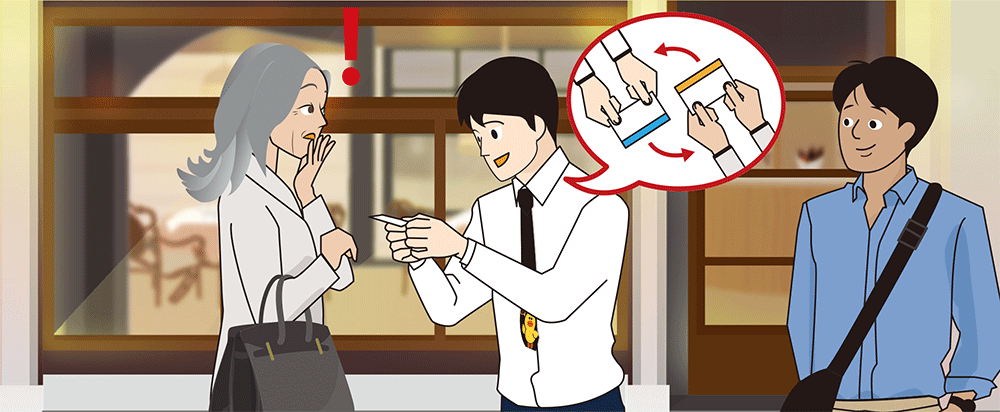Today's Point
今日のポイントまた、〈主語+ may +~(動詞の原形)〉は、「主語が~してもいい/することができる」という「許可」あるいは「可能性」を表します。例えば、You may park your car here.「あなたは車をここに駐車してもいいですよ」のように使います。

ディナーの待ち合わせ場所に、取引先のローラがやって来ました。
まずは挨拶の後、名刺交換。ケンがローラに「名刺をいただけますか?」と聞いています。
そのローラですが、ケンの服装でとても気に入ったものがあるようです。
そう、仕方なく締めてきたあのネクタイです…。

Story of the Day
今日のストーリーRepeat after your teacher.
先生の後に続けて言ってみましょう。
| James: Hello, Laura. | ジェームズ:こんにちは、ローラ。 |
|---|---|
| James: Nice to see you! | ジェームズ:また会えてうれしいです! |
| Laura: Nice to see you too, James. | ローラ:わたしもよ、ジェームズ。 |
| James: This is my colleague, Ken. | ジェームズ:こちらは同僚のケンです。 |
| Laura: Hi Ken. | ローラ:こんにちは、ケンさん。 |
| Laura: It’s a pleasure to meet you. | ローラ:はじめまして。 |
| Ken: It’s nice to meet you too, Laura. | ケン:こちらこそ、はじめまして、ローラさん。 |
| Ken: Here’s my business card. | ケン:これが僕の名刺です。 |
| Laura: Oh, thank you. | ローラ:まあ、ありがとう。 |
| Ken: May I have your business card? | ケン:名刺をいただけますか? |
| Laura: Oh dear. | ローラ:あらまあ。 |
| Laura: I don’t have my business cards with me. | ローラ:いま名刺を持っていなくて。 |
| Ken: Oh, okay. That’s fine. | ケン:あ、そうなんですね。大丈夫です。 |
| Laura: My colleague Alyssa will be here soon. | ローラ:同僚のアリッサはすぐ来ますので。 |
| James: Okay. We’ll wait for her. | ジェームズ:了解です。お待ちしましょう。 |
| Laura: I think we can go. | ローラ:私たち、先に行ってもいいと思います。 |
| Laura: She will join us later. | ローラ:彼女は後から合流しますから。 |
| James: Okay. | ジェームズ:わかりました。 |
| Laura: By the way, I love your tie, Ken. | ローラ:ところで、私ケンさんのネクタイ好きだわ。 |
| Ken: Oh. Thank you! | ケン:あっ、ありがとうございます! |
Key Phrase
キーフレーズRepeat after your teacher.
先生の後に続けて言ってみましょう。
May I have your business card?
Vocabulary / Expressions
ボキャブラリーと表現Repeat after your teacher.
先生の後に続けて言ってみましょう。
| join(動詞) | 参加する、合流する |
|---|---|
| pleasure(名詞) | 喜び、楽しみ |
| business card | 名刺 |
Exercise
エクササイズ ARead the conversation aloud with your teacher. Fill in the blanks with a, b and c.
After that, fill in the blanks with your own words and practice the conversation with your teacher.
下記の会話の空欄に、a, b, cそれぞれの言葉を入れて、先生と一緒に音読してみましょう。 そのあと、空欄に入る言葉を自分で考えて、先生と会話をしてみましょう。

| Laura: Hi Ken. | ローラ:こんにちは、ケンさん。 |
|---|---|
| Laura: It’s a pleasure to meet you. | ローラ:はじめまして。 |
| Ken: It’s nice to meet you too, Laura. | ケン:こちらこそ、はじめまして、ローラさん。 |
| Ken: Here’s my business card. | ケン:こちらが僕の名刺です。 |
| Laura: Oh, thank you. | ローラ:まあ、ありがとう。 |
| Ken: May I _______ (a. sit down b. see the business plan c. try this)? | ケン:(a. 座って b. 経営プランを見て c. これをやってみて)いいですか? |
| Laura: Of course. | ローラ:ええ、もちろんです。 |
| Ken: _______ (a. Thank you. b. I appreciate it. c. Thanks.) | ケン:(a. ありがとう b. ありがとうございます c. どうも)。 |
Exercise
エクササイズ B (Vocabulary Building)Choose the correct word from the box.
空欄に当てはまる言葉を選んで文章を完成させてください。
- join
- pleasure
- business card
- A businessman needs a __________.
- I will _______ the new health club.
- Playing tennis is my _______.
Exercise
エクササイズ CSituation: Ask your friend for phone number and other information.
ロールプレイ: 友人に電話番号やその他の情報を聞いてください。


Extra Exercise
Try the Extra Exercises. As with Exercise A, become familiar with some of these more advanced phrases.
エクストラ・エクササイズに挑戦してみましょう。
エクササイズAと同じ要領で、より高度なフレーズを練習してみましょう。
| Ken: Hello. Thank you for calling Hayabusa Motors Philippines. |
|---|
| Ken: This is Ken. |
| Laura: Hello. This is Laura. |
| Laura: May I speak to (a. Cindy b. the person in charge of marketing c. the manager of your department)? |
| Ken: I’m afraid she’s not available at the moment. |
| Ken: You may (a. be able to reach her on her cell b. have to wait for a couple of hours c. not be able to catch her today). |
| Laura: Okay. Can you ask her to call me back? |
| Ken: Certainly. Thank you for calling, Laura. |
| James: Who was that? |
| Ken: That was Laura. |
| James: Which Laura? There’s a few we know of. |
| Ken: Oh... I forgot to ask which company she’s from. |
| James: Now that your English has improved, we need to start working on your clumsiness... |

- in charge of~は「~を担当している」という意味で、the personを後ろから修飾しています。
- I’m afraidは「残念ながら」「あいにく」「せっかくですが」という意味で、相手にとって好ましくないことがらを伝える前につけると、柔らかい印象を与えることができます。他にも、I’m afraid our boss didn’t like your idea.「残念ながらボスは君のアイデアが気に入らなかったようだ」のように使います。
- clumsinessは「不手際」。